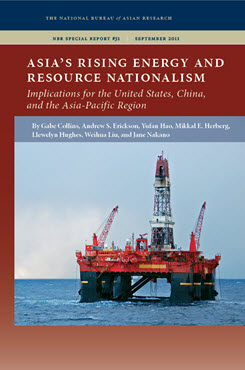Rare Earth Trade Challenges and Sino-Japanese Relations
A Rise of Resource Nationalism
This essay illustrates the role of rare earth minerals in the Japanese economy and the Sino-Japanese trade relationship and examines the implications of the halt of Chinese rare earth exports to Japan in fall 2010.
EXECUTIVE SUMMARY
This essay illustrates the role of rare earth minerals in the Japanese economy and the Sino-Japanese trade relationship and examines the implications of the halt of Chinese rare earth exports to Japan in fall 2010.
MAIN ARGUMENT
China’s global dominance in rare earth production has drawn heightened scrutiny in recent years. At the same time that the burgeoning clean energy sector increases global rare earth demand, China continues to tighten its export quotas. As a leading developer and manufacturer of clean energy products, Japan has watched China’s economic policy developments closely and strived to reduce its heavy dependence on Chinese rare earths. The halt of Japan-bound exports in fall 2010 was a turning point in the bilateral trade relationship that signified the start of a new phase in clean energy competition and transformed Sino-Japanese economic relations from a mutually prosperous rivalry to one with an undertone of mistrust.
POLICY IMPLICATIONS
- Rare earths as a commodity currently lack a global marketplace that would enable the proper signaling of supply and demand levels as mediated by price. If such a market were established, prices would likely become more stable. This could also help address China’s concern that its supplies are undervalued, facilitating the exploitation of its natural resources.
- Chinese dominance in rare earth production will likely continue in coming years, even if importers accelerate efforts to reduce dependence on China. However, China’s tightening of export quotas, accentuated by the halt of Japan-bound exports in fall 2010, was likely the beginning of the end of China’s dominance.
- China has legitimate environmental concerns that stem from its production practices. If environmental protection is a key priority, China would benefit from cooperation with high-tech countries such as Japan and the U.S.
- Regardless of Beijing’s intent, the halt of exports to Japan undermined China’s standing as a reliable trading partner in the eyes of many, casting a cloud over its eminence as a rising stakeholder in international regimes and possibly affecting its economic allure.


